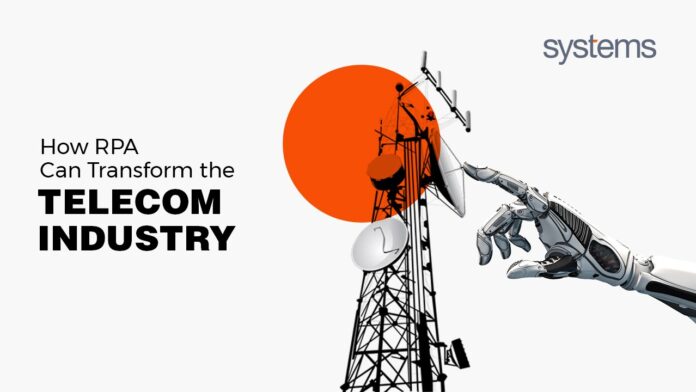The telecom sector has seen unprecedented growth. Disruptive advancements like IoT have significantly increased the number of devices connected globally and technologies like 5G will further boost this number. But this growth is not without challenges and difficulties. Telecom players are in a constant struggle to navigate the growing demand for seamless connectivity, customized solutions, product and service variety, large amounts of data to be handled, and fierce competition. To reduce costs, enhance customer services, boost operational efficiency, and improve data quality, telecom companies are increasingly adopting robotic process automation (RPA).
What is RPA?
Robotic process automation is the technology that allows the automation of business processes by configuring software robots or ‘bots’ which can mimic a wide range of human-computer interactions. These bots can be programmed to take care of repetitive, rule-based and high-volume tasks allowing the human workforce to focus on more important and valuable work.
Prominent RPA Use Cases in Telecom
Telecom industry has one of the highest adoption rates of RPA technology. There are several use cases that consist of rule-based, manual, and repetitive business processes. Automating these cases can unlock extraordinary value for telecom companies. Here are a few:
1. Report Preparation and Distribution
RPA bots running on the CRM can process hundreds of daily orders and generate relevant reports. The content of the generated reports can also be analyzed based on the set criteria, and emailed to the relevant stakeholders. This ensures an efficient flow of information.
2. Competitor Analysis
Ecommerce is becoming the norm in the telecom industry. RPA, with its capacity operate round-the-clock and error-free, can provide telecom companies with the most meticulous price analyses by tracking changing pricing trends at individual, category, and brand level, unlocking deeper insights into what the competition is doing.
3. Sales Order Processing
RPA can capture the business process tasks performed by the employees and, based on those actions, can generate a well-structured workflow which can serve as an infrastructure for automated processes. By mapping each process step with its associated cost for manual execution, ROI can be analyzed to determine automation of which steps can lead to higher returns.
4. Data Management
Telecom industry depends on massive amounts of data stored in various file formats. RPA bots can help organize this data into a structured and uniform format. Combined with technologies like artificial intelligence, RPA can enable telecom companies to engage in predictive analyses based on structured datasets with much higher accuracy.
5. Customer Care
A telecom company’s customer care department is at the front line of direct customer engagements. Prompt resolution of customer issues is extremely critical to drive customer satisfaction. RPA software can enable bots to rapidly access data, which in turn assists telecom agents in addressing high volumes of customer demands on their first call without the need for repeated follow-ups. This helps the companies ensure customer retention and loyalty. Automating a customer care department’s manual complaints resolution process can enable telecom companies to deliver not just fulfilling, but delightful experiences.
Even in Pakistan, the adoption of RPA is on the rise across different industries. Discover how Pakistan’s biggest exporter of IT services Systems Limited boosted the efficiency of a prominent telecom services provider’s customer care function with RPA.
6. Invoice and Purchase Order Processing
RPA technology can also be used in the telecom industry to digitize invoicing and emails, which greatly helps employees to save up their valuable time to focus on work that generates more value and revenue.
The list doesn’t end here – there are other numerous use cases that can realize true benefits of RPA, such as, network management, customer onboarding/offboarding, partner query responses, debt collection, and so much more.
Concluding Thoughts
RPA’s scalability and flexibility make it a perfect fit for telecommunications as the industry undergoes rapid growth and development on a global scale. As with the telecom sector, RPA is also continually evolving and expanding its scope to more use cases within the domain with potential for further growth as the technology progresses.
If you want to know more about how RPA can be a good fit for your business and help you gain a sustainable competitive edge, contact Systems Limited.





Robotic process automation is already being implemented in Pakistan telecom industry. Most of the WhatsApp based customer support systems are operated by robots. With passage of time, it will be extended to other domains as well.